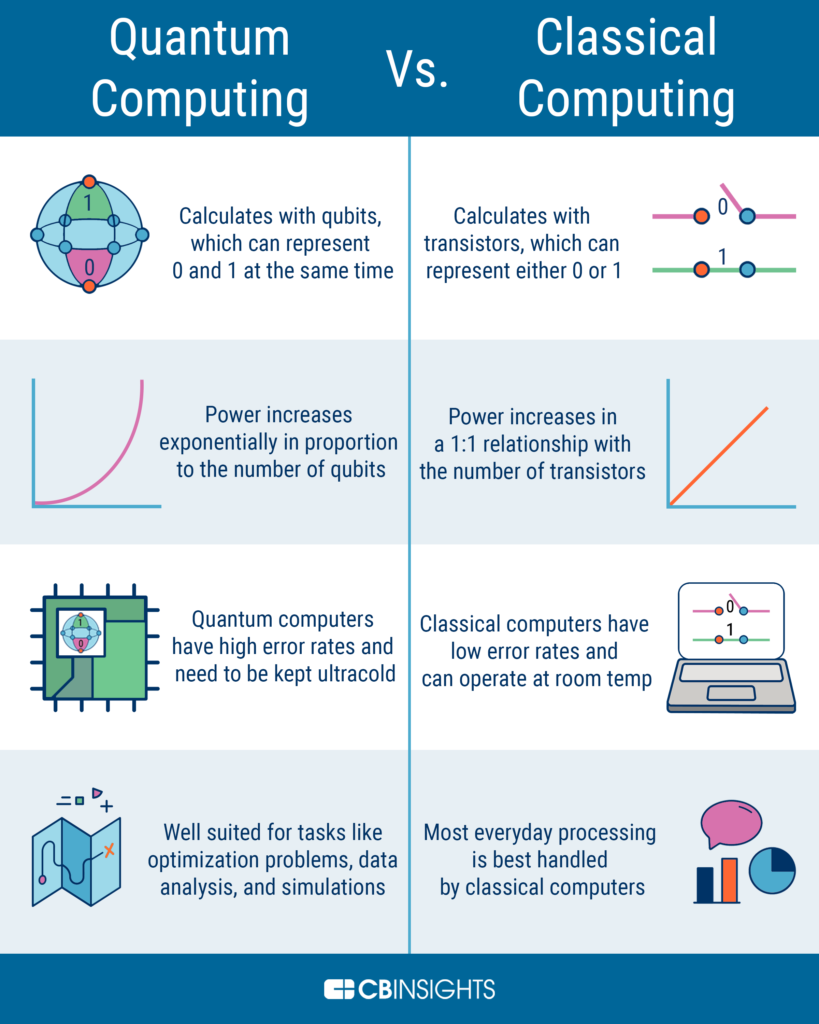I’ve always been interested in exploring new and emerging technologies. One of the most exciting developments in recent years, in my opinion, has been the rise of quantum computing. Quantum computing is a type of computing that uses quantum mechanics to process information in a way that is fundamentally different from classical computing. In this blog post, I will discuss how quantum computing is currently being used in today’s world and some of the potential applications of this technology in the future.
What is Quantum Computing?
Before diving into how quantum computing is currently being used and its potential future applications, let’s first take a moment to understand what it is. Unlike classical computers, which use bits (which can be either a 0 or 1) to process information, quantum computers use quantum bits (or qubits) to process information. Qubits can be both a 0 and a 1 at the same time, which is known as superposition. They can also be entangled, which means that their state is dependent on the state of other qubits. If all of this sounds confusing, don’t worry. It is supposed to be difficult to understand, and even after further research, I can still barely comprehend how it works exactly.
Because of these unique properties, quantum computers are well-suited to solving problems that are incredibly difficult (if not impossible) for classical computers to solve. This includes problems in fields such as coding, chemistry, and physics. Let’s take a closer look at how quantum computing is currently being used in these and other fields.
Current Applications of Quantum Computing
One of the most exciting applications of quantum computing is in the field of coding. Quantum computers are capable of breaking many of the encryption schemes that are currently used to secure online transactions and communications. This is because quantum computers can easily factor in large numbers, which is a key part of many encryption schemes. As a result, many researchers are working on developing new encryption methods that are resistant to quantum computing attacks. Imagine the infinite possibilities when it comes to encryption. The amount of big data being used in order to break through this would be practically impossible for us humans. However, for something like quantum computers, this task isn’t very difficult. This makes me think back to some of our discussions in class when we talked about AI and other emerging technologies that will take over many industries. I believe something like this will completely revolutionize this industry and many more.
Another area where quantum computing is being explored is in the field of materials science. Quantum computers are well-suited to simulating the behavior of molecules and materials, which can help scientists design new materials with specific properties. For example, researchers are using quantum computers to simulate the behavior of high-temperature superconductors, which could lead to the development of new materials that can conduct electricity with zero resistance. This innovative idea could transform our idea and use of electricity. Sustainable energy could be the key to historical events in our time, including even world peace!
In the healthcare industry, quantum computing is being explored as a way to analyze large datasets and develop personalized treatment plans. For example, researchers are using quantum computers to analyze large amounts of genomic data to better understand how genes and proteins interact. This information can then be used to develop new treatments for diseases such as cancer. From other things I’ve seen, I theorize that something like death can even be overcome in the future. While this might sound insane, our perception of death involves the brain shutting down. The brain consists of billions of neurons, firing all the time rapidly. If we were somehow able to use quantum computing to analyze and understand the patterns associated with the brain, we might be able to replicate and synthesize someone’s brain.
The specific reason I think this is possible is due to the comparative speed it takes quantum computers to achieve things versus a classic computer. For example, a task that would take a classic, modern computer 10,000 years to compute would be done by a quantum computer in only FOUR MINUTES. That number is so insane, and I think with that kind of processing power, the possibilities are truly endless.
Future Applications of Quantum Computing
While quantum computing is already being used in a variety of fields, the full potential of this technology has yet to be realized. In the future, quantum computing could revolutionize various industries, including finance, logistics, and transportation.
One of the most promising applications of quantum computing is in the field of optimization. Many real-world problems, such as scheduling and route optimization, can be incredibly complex and time-consuming to solve using classical computers. Quantum computers, however, are well-suited to solving these types of problems, which could have a major impact on industries such as transportation and logistics.
In the finance industry, quantum computing could be used to simulate financial markets and analyze complex financial data. This could help investors make better investment decisions and better manage their risk. Additionally, quantum computing could be used to develop new financial models that take into account factors that are difficult to model using classical computers, such as the behavior of individual investors.
Another area where quantum computing could have a significant impact is the development of new materials. Quantum computers are already being used to simulate the behavior of complex molecules and materials, but in the future, they could be used to design entirely new materials from scratch. These materials could have a wide range of applications, including making stronger and more durable construction materials for example.
All in all, I believe quantum computing is one of the most important technological innovations, even being up there with AI. I hope we touch on it in class sometime, because I’m positive it will end up changing the world.
Sources:



